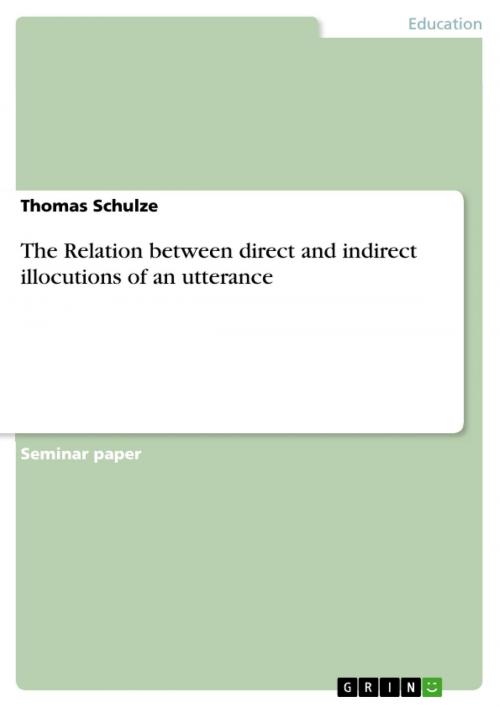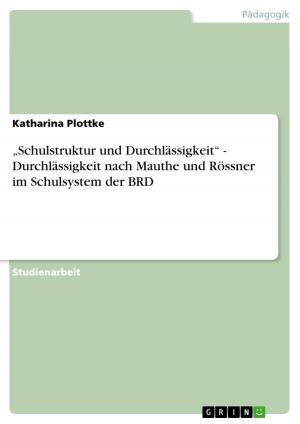The Relation between direct and indirect illocutions of an utterance
Nonfiction, Reference & Language, Study Aids, ESL, Foreign Languages| Author: | Thomas Schulze | ISBN: | 9783656023456 |
| Publisher: | GRIN Verlag | Publication: | October 7, 2011 |
| Imprint: | GRIN Verlag | Language: | English |
| Author: | Thomas Schulze |
| ISBN: | 9783656023456 |
| Publisher: | GRIN Verlag |
| Publication: | October 7, 2011 |
| Imprint: | GRIN Verlag |
| Language: | English |
Seminar paper from the year 2009 in the subject English - Pedagogy, Didactics, Literature Studies, grade: 1,3, Humboldt-University of Berlin (Institut für Anglistik und Amerikanistik), course: Seminar - Semantics, language: English, abstract: If a speaker asks 'Would you like a cup of coffee?', how then does the hearer know that this is an act of asking and that it is not an act of, for example, warning? The idea of direct and indirect illocutions, within the field of interpersonal and non-literal meaning in semantics, deals with such questions. Why and in how far can speakers of a language differentiate between the mere literal meaning and reading of an utterance and the meaning beyond this literal form? And how can we form rules and ideas to identify such components in an utterance? The following essay will therefore concentrate on that question. As a matter of fact, it is therefore necessary to take a look at some other ideas within the field of illocution. The first chapter deals with the act of assertion, the idea of speech acts and the distinction between illocutions and perlocutions. In the second chapter, we will focus on the distinction between direct and indirect illocutions, followed by the third chapter, dealing with the relation between both types of illocutions of an utterance. Direct and indirect illocutions are naturally related in several ways, as we will discuss this point later on. In fact, direct and indirect illocutions are related in many ways. The following essay will firstly build a basis for that discussion, focus on the need for a distinction between direct and indirect illocutions and finish with a discussion of four possible relations within the field of illocutions. As regards these ideas, the work of Hurford, Heasley and Smith built the basis for this essay. Furthermore, Kreidler's and Austin's standard works provided helpful examples and definitions. The work of Leech gave interesting hints at the relation between indirect and direct illocutions and connected them to the field of pragmatics.
Seminar paper from the year 2009 in the subject English - Pedagogy, Didactics, Literature Studies, grade: 1,3, Humboldt-University of Berlin (Institut für Anglistik und Amerikanistik), course: Seminar - Semantics, language: English, abstract: If a speaker asks 'Would you like a cup of coffee?', how then does the hearer know that this is an act of asking and that it is not an act of, for example, warning? The idea of direct and indirect illocutions, within the field of interpersonal and non-literal meaning in semantics, deals with such questions. Why and in how far can speakers of a language differentiate between the mere literal meaning and reading of an utterance and the meaning beyond this literal form? And how can we form rules and ideas to identify such components in an utterance? The following essay will therefore concentrate on that question. As a matter of fact, it is therefore necessary to take a look at some other ideas within the field of illocution. The first chapter deals with the act of assertion, the idea of speech acts and the distinction between illocutions and perlocutions. In the second chapter, we will focus on the distinction between direct and indirect illocutions, followed by the third chapter, dealing with the relation between both types of illocutions of an utterance. Direct and indirect illocutions are naturally related in several ways, as we will discuss this point later on. In fact, direct and indirect illocutions are related in many ways. The following essay will firstly build a basis for that discussion, focus on the need for a distinction between direct and indirect illocutions and finish with a discussion of four possible relations within the field of illocutions. As regards these ideas, the work of Hurford, Heasley and Smith built the basis for this essay. Furthermore, Kreidler's and Austin's standard works provided helpful examples and definitions. The work of Leech gave interesting hints at the relation between indirect and direct illocutions and connected them to the field of pragmatics.















